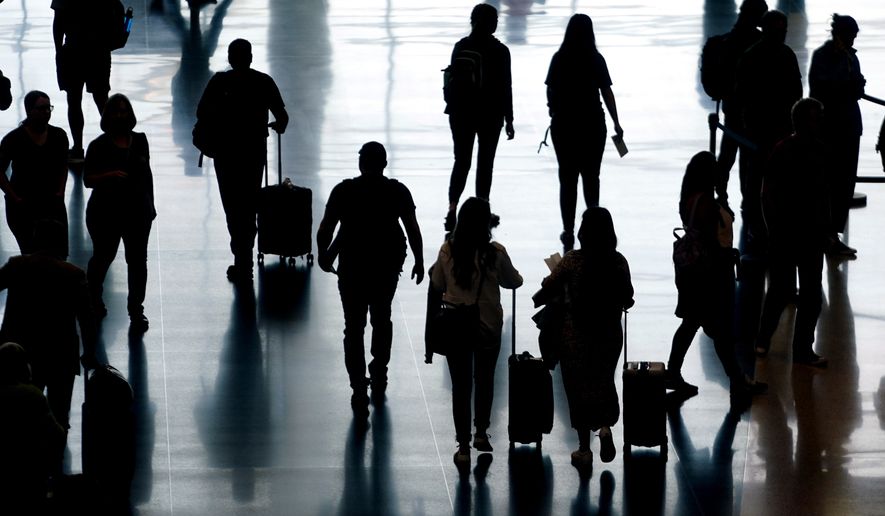Millions of Americans will spend part of the Fourth of July weekend standing in long airport lines, squeezing onto crowded and delayed flights or, even worse, scrambling to make other arrangements after their flights are canceled. Don’t expect things to get better after the holiday crunch. Analysts say this is what air travel will look like for a while — potentially years.
Bailed out by taxpayers when COVID-19 nearly grounded the industry, airlines have struggled to replace the pilots, cabin crews and counter staff lost over the past two years. The airports they serve also face critical shortages of workers, including security personnel and air traffic controllers.
Almost 800 flights were canceled Sunday. The trend spilled over to Monday, when another 747 flights were canceled, according to flight-tracking website Flightaware.com.
“This is the saddest state of affairs I have seen in 45 years of observing this industry, and it will only get worse as demand and flight activity increase,” said Robert W. Mann Jr., an independent airline analyst and consultant in Port Washington, New York.
Mr. Mann and other analysts say it will take time to replace the unexpected numbers of pilots retiring from the industry and to develop a new generation of air traffic controllers. Training was put on hold during two years of COVID-19 restrictions.
The pilot shortage, in particular, is going to get worse. Mr. Mann said about one-quarter of pilots will hit the mandatory retirement age of 65 in the next three years.
“If nothing changes, we’ll have this problem for years to come,” Mr. Mann said. “It’s not immediately solvable because pilots just don’t like the job anymore the way they did 35 years ago.”
Helane Becker, an airline analyst at investment banking company Cowen, said it takes two to four years to train an air traffic controller and another two to three years “for that person to become proficient.”
“Between that and the lack of pilots and other crew, we don’t expect an improvement for a few years,” Ms. Becker said.
Flyers Rights, a nonprofit passengers advocacy group that advises the Federal Aviation Administration on safety measures, said record-level flight delays and cancellations have affected about 100 million customers this year.
Paul Hudson, the group’s president, said “nobody knows” when the flight interruptions will end.
“It’s never been this bad,” Mr. Hudson said.
The frustrations in the air haven’t dampened Americans’ desire to travel. AAA predicts that 47.9 million people in the U.S. will drive or fly this weekend, up 3.7% from last year and almost back to pre-pandemic levels.
Auto travel is surging despite historically high gasoline prices.
“People are ready for a break, and despite things costing more, they are finding ways to still take that much-needed vacation,” said Paula Twidale, AAA Travel senior vice president.
AAA says concerns with flight cancellations and delays may be driving more people to take to the road.
Consumer complaints about airlines jumped 300% in April over the same month in 2019, the Department of Transportation reported last week.
The report said the nation’s 10 major airlines canceled 2.3% of all flights in April, compared with 0.5% during the same month last year.
Mr. Mann, a former American Airlines senior executive, said the problem has been “decades in the making” and will not disappear until carriers “stop blaming others and step up and manage their flights, using their own business rules, as they could have for 20 years.”
He said the Department of Transportation “has been loath to intervene, despite funding the industry through the pandemic.”
“DOT should have called the industry on the carpet each time a check was issued, demanding operational reliability, if not the ‘operational excellence’ a number of them have claimed for years to be pursuing and have yet to deliver,” Mr. Mann said.
As flights become scarcer, airfares have risen.
According to the Bureau of Labor Statistics, airfares shot up by 18.6% in April, when many people started booking summer flights. A “good deal” round-trip domestic flight in June averaged $398, more than $100 pricier than last year, according to Hopper.
Although airlines must refund passengers for canceled flights, they sometimes send travel vouchers instead of payment or delay refunds because it’s “profitable for them,” Mr. Hudson said.
After pandemic lockdowns shrank air travel by as much as 95% beginning in March 2020, the federal government gave $54 billion in bailouts to keep the industry afloat. Many pilots and other employees have since taken early retirement or switched careers.
“Employees are sitting home, collecting their checks from the airlines, and some are getting other jobs. You can’t just restart things after two years,” Mr. Hudson said.
This summer, passengers have waited for hours as airlines cancel or delay thousands of flights in the U.S. and Europe.
The number of U.S. domestic flight interruptions spiked during the Memorial Day and Father’s Day weekends.
Some customers have vented their frustrations on Twitter.
“There’s nothing to book since most of the flights to said city have been canceled,” sportscaster Jon Alba said in a tweet to United Airlines as he attempted to rebook a flight on Tuesday.
Transportation Secretary Pete Buttigieg warned airline CEOs in a meeting this month that he could force them to hire more pilots.
On Friday, the airline industry group Airlines for America said in a letter to Mr. Buttigieg that a shortage of federal air traffic controllers has been a factor in at least one-third of recent cancellations.
The Transportation Department said in an email to The Washington Times that it is working collaboratively “to ensure airlines and the entire aviation system are able to meet passengers’ expectations.”
“After receiving $54 billion in pandemic relief to help save the airlines from mass layoffs and bankruptcy, the American people deserve to have their expectations met,” the statement read.
• Sean Salai can be reached at ssalai@washingtontimes.com.




Please read our comment policy before commenting.